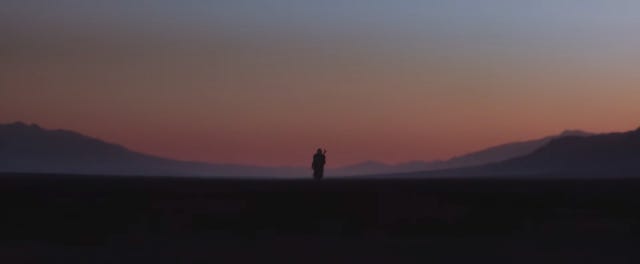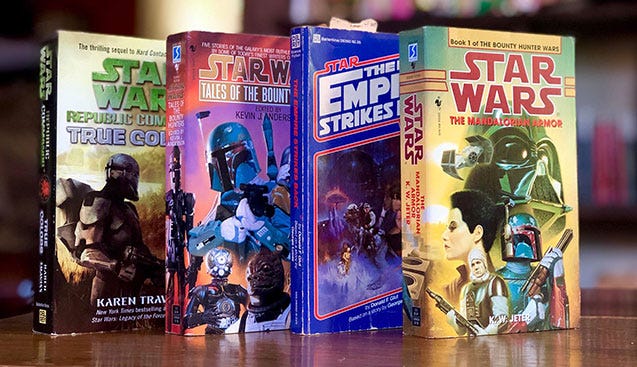Oh no, John Campbell

Hello!
It's been quite the week. Some good news: I'm picking up some freelance work at The Barnes and Noble Sci-Fi & Fantasy Blog, it looks like I'll be picking up some of my regular book coverage with Polygon, and will be regularly writing news for Tor.com. I kicked off that work last week with a handful of posts, and then a whole bunch this past weekend, covering the news that came out of Disney's D23 conference in Anaheim, California. Other projects are in the works as well, and I'll be teaching at Champlain College this coming fall semester. Plus, you know, the book.
Onwards.
Oh John Campbell, No
The Hugo Awards were handed out at WorldCon last week, and one particularly notable happening came with Jeanette Ng's acceptance for the John W. Campbell Award for Best New Writer. They posted their speech online, and it's well worth reading:
John W. Campbell, for whom this award was named, was a fascist. Through his editorial control of Astounding Science Fiction, he is responsible for setting a tone of science fiction that still haunts the genre to this day. Sterile. Male. White. Exalting in the ambitions of imperialists and colonisers, settlers and industrialists.
Some people took exception to their words — I've seen scattered comments from randos decrying Ng's speech, but for the most part, the field has overwhelmingly been supportive. It's a nice change of pace from a couple of years ago, when the discussion would have been much louder.
This isn't exactly a new revelation about Campbell — his words have been enshrined in his magazines for decades. He had editorials such as "The Lynch-Mob Mentality" in July 1969 in which he compares Congress's ban on television advertising for cigarette companies to African-Americans being brutally murdered. There's "A Difference in Intelligence," from October 1969, in which he writes:
"Elaborate efforts were made to compare Black and White children from homes of similar background, under similar conditions of schooling. The full data on the study is available to anyone who really is interested in getting facts. [note, he doesn't actually name the study, its authors, or look into its methodology] It shows that Black children had lower IQ's, and learned more slowly, than White children did."
In November 1969, he writes that the only times when taxation is warranted is when it's to support a military establishment (or space programs). In other editorials, he derides anti-war activists, sociologists, and a variety of others in dramatic, whataboutisms, and passive-aggressive posturing. I am relieved to see that a number of readers push back on his words.
Let's not dance around this: he was deeply racist and fascistic, and at the same time, he left a huge footprint in the genre. He helped start what the genre is now known for — stories of plausible science. But a footprint isn't a legacy. As Ng said in their talk:
"But these bones, we have grown wonderful, ramshackle genre, wilder and stranger than his mind could imagine or allow."
There's a good end to this story: Dell Magazines, which administers the award, decided to change the name to Astounding Award for Best New Writer. Campbell might have done much to advance the careers of some of the genre's best authors, like Heinlein or Asimov. But he perpetrated much, setting down wheel ruts that we've taken far too long to shift out of. That's slowly been changing, and that's a good thing.
Vode An!

So, how about that trailer for The Mandalorian? It's the first look at a project that's been in the works for a little while: the first-ever live-action Star Wars TV show. George Lucas had planned one way back in 2005 — I remember him announcing a TV project at Celebration III in Indianapolis. But that never panned out, and with Disney launching its own streaming service, all parts of the company — including Lucasfilm — have jumped into create their own shows.
For one, Disney has to attract a lot of subscribers, quickly. They're behind the curve and companies like Netflix and Amazon, and other competitors, like Apple and WarnerMedia, are launching their own platforms. Disney does have a big advantage here: they have a huge catalog that they can deploy pretty quickly, and original Star Wars and Marvel projects will be big draws. But — they'll only be big draws if the content is actually good. This is a key point where Netflix is in trouble, I think: they have some good — and even great shows — but not consistently. Stranger Things? Pretty great. Altered Carbon? Good. The OA, Lost in Space, and Another Life (reportedly — I haven't seen it yet)? Lacking.
The Mandalorian? This looks pretty damn good — a proper western in space, following a Mandalorian gunslinger on the outer reaches of the galaxy. What looks really exciting here is that we see more of an impact in what the galaxy looks like after the fall of the Empire — something we've seen in a bunch of books over the recent years (Alphabet Squadron comes to mind). The result looks super grim, and I'm here for it.

If you want a bit of a refresher on where the Mandalorians came from, I wrote up a primer for The Barnes and Noble's Sci-Fi and Fantasy Blog. The short answer is that it's a warrior culture that played a pretty quiet role throughout Star Wars history until The Clone Wars multimedia project and Karen Traviss came along. They became a bit more prominent in The Clone Wars TV series, and they're now set to be even bigger now.
Dragon*Con!
On Friday, I'm headed off to Atlanta, Georgia for Dragon*Con! This is the first time that I'll be attending: it's a bit of a mecca for cosplay and costuming fans, and I'm looking forward to meeting a bunch of people and taking a ton of pictures. While I'm there, I'll be bringing down a couple of costumes with me: a Belter jumpsuit from The Expanse and my Blue Squadron pilot, which I've been putting together this summer.
Specifically, I'm modeling the look of General Antoc Merrick from Rogue One, which was a bit of a complicated job — his helmet has lots of stripes and colors. I finished it this afternoon, and it came out wonderfully — it's hard to describe the feeling of pride in one's work when you step back and behold a costume that came out really, really well. You start from random pieces and operate on no small amount of faith that it'll look like it should when you reach the end — whenever that might be.
I love the look of this pilot costume, moreso than the more iconic orange that most Rebel Alliance pilots wear. Since 2003, I've exclusively work trooper costumes with the 501st Legion — a two Stormtroopers, a Shoretrooper, two Clone Troopers, and a First Order heavy trooper. This'll be a bit of a different experience. For one, it's more comfortable, but it should also let me see quite a bit better. Stay tuned for pictures at some point in the near future, or follow me on Twitter, where I'll be posting images over the course of the weekend.
Further Reading
- Apollo Podcast. Something I meant to mention a couple of weeks ago: you should check out the Washington Post's Moonrise podcast. Written and hosted by Lillian Cunningham, it's a fantastic look at why the US decided to go to the Moon. This is a topic that's near and dear to my heart: my MA capstone was on the shift from military rockets to the Apollo program. She spends a couple of episodes looking into the history of science fiction, and how the idea that we could send people to the Lunar surface percolated through science fiction before ending up as a real thing. Episode 6 just dropped.
- Draconic Legacies. Kotaku did a couple of features a while back on the history of Dungeons & Dragons, and they just ran a new one that pushes back on the popularly-held narrative that Gary Gygax was the one person who created it. Legacies are complicated things, and it's nice to see some additional nuance and reporting here.
- Dragon Awards. Speaking of Dragons, go vote for the Dragon Awards. There's some good authors nominated there. Anyone can vote!
- Katana found? Over on Polygon (!!), I point out something that I noticed in the latest "special look" teaser that Lucasfilm released for The Rise of Skywalker: a fleet of old Imperial Star Destroyers, which harkens back to Timothy Zahn's 1992 novel, Dark Force Rising, which makes me wonder if the sequel trilogy is taking some more cues from the non-canon works. If so, that's pretty interesting, on a bigger story level, because it means that that machinery that ran the SWEU is still running, and that there could be more in store for future projects. Those books might no longer be canon, but they can still contribute to the future of the franchise.
- Publishers sue Audible. Back in July, I wrote a piece about how publishers were pretty furious about a program that Audible announced it was launching: captions. How furious? All five major publishers just filed a lawsuit against the company, saying that the feature "converts the narration into unauthorized text, and distributes the entire text of these 'new' digital books to Audible's customers." That's not an unexpected response: Audible really doesn't have the right to do this sort of program. It's fine if they want to launch it, but they really need to pay for those rights.
- Stop with the unicorns. A while ago, I wrote about a speculative opinion series in The New York Times. There have been a couple since then, but one that went up yesterday caught my eye: it's by Fran Wilde, and it's about a toy company releasing a line of bioprinter toys aimed at kids.
Making bioprinting more accessible to the public — especially to children — will be likely to lead to even worse disasters than last Friday’s blockade of the Chicago I-899 skyways off-ramp by a herd of miniature unicorns. Sure, the unicorns (whose origins are unknown) were the size of ducklings, but their appearance caused several accidents and a moral quandary
Currently Reading
I just finished Oliver Morton's phenomenal book The Moon: A History for the Future. There were a glut of books out this summer to coincide with the anniversary of the Apollo 11 landing, but of all the ones I looked and have read over the years, Morton's stands amongst the finest that examine the Moon and travel to it.
For one, it's an ambitious read — he doesn't just cover humanity's voyages to it; he looks to understand our entire relationship with it, from geologic, cultural, economic, and historical perspectives. There's a lot to take in with it: nuanced understandings of how and why we went to the moon in the first place, how the moon possibly impacted life on Earth from its inception, and why we gaze up at it on a clear night. For science fiction writers, I can't recommend it enough for background reading, especially for those writing stories about the body. There's some excellent observations about the realistic nature of theorized economic gains, and why we might want (or not want to) go back. It's a book that looks at the mythos that surrounds the moon, but also puts it into a sort of realistic context. Anyway, go read it — or listen to it; the narrator, Neil Dickson, is fantastic.
Next up, I'm going to finished Amal El-Mohtar and Max Gladstone's This Is How You Lose the Time War, and I'm planning on picking up Delilah S. Dawson's new Star Wars novel, Black Spire, next.
That's all for now. Thanks again for reading — if you enjoyed this, please consider sharing it with a friend.
Cheers,
Andrew